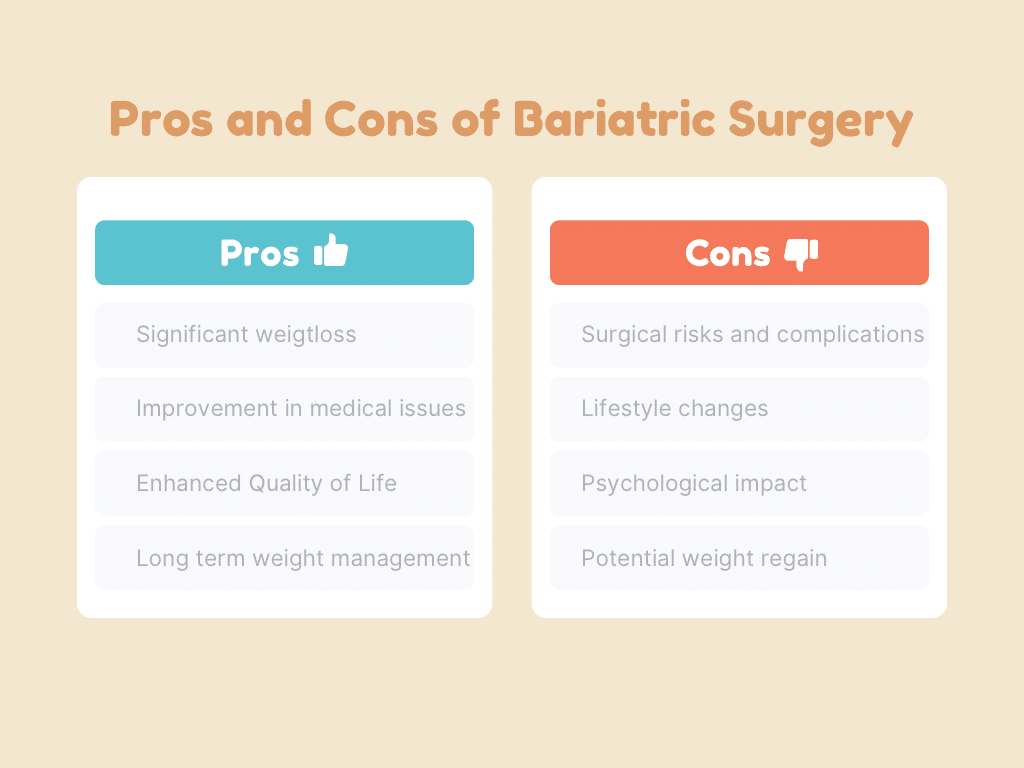Table of Contents
- Bariatric Surgery: Weighing the Pros and Cons – Is It Right for You?
- Understanding Bariatric Surgery
- The Pros of Bariatric Surgery
- The Cons of Bariatric Surgery
- Is Bariatric Surgery Right for You?
- Conclusion
Bariatric Surgery: Weighing the Pros and Cons – Is It Right for You?
Obesity is a growing health concern worldwide, leading to various health complications such as diabetes, heart disease, and certain cancers. For individuals struggling with severe obesity, bariatric surgery can be a life-changing intervention. However, like any medical procedure, it comes with its own set of advantages and disadvantages. This comprehensive guide will help you understand the pros and cons of bariatric surgery, enabling you to make an informed decision about whether it is the right choice for you.
Understanding Bariatric Surgery
Bariatric surgery encompasses a range of procedures designed to help individuals lose weight by making changes to the digestive system. The most common types include gastric bypass, sleeve gastrectomy, and adjustable gastric banding. These surgeries work by either restricting the amount of food the stomach can hold, causing malabsorption of nutrients, or a combination of both.
Gastric Bypass involves creating a small pouch at the top of the stomach and connecting it directly to the small intestine. This limits food intake and reduces nutrient absorption.
Sleeve Gastrectomy entails removing a large portion of the stomach, leaving a banana-shaped section that holds less food.
Adjustable Gastric Banding places an inflatable band around the upper part of the stomach, creating a small pouch that can be adjusted to control food intake.

The Pros of Bariatric Surgery
1. Significant Weight LossBariatric surgery is highly effective in achieving substantial weight loss. Studies show that patients can lose 60-80% of their excess weight within the first two years post-surgery. This dramatic reduction in weight can have a profound impact on overall health and quality of life.
2. Improvement in Obesity-Related Conditions
Weight loss resulting from bariatric surgery often leads to the improvement or resolution of obesity-related health conditions. These include type 2 diabetes, hypertension, sleep apnea, and high cholesterol. For many, the surgery can be life-saving by reducing the risk of these serious health issues.
3. Enhanced Quality of Life
With significant weight loss, many patients experience improved mobility, increased energy levels, and enhanced self-esteem. Activities that were once difficult or impossible become more accessible, contributing to a better overall quality of life.
4. Long-term Weight Management
Unlike other weight loss methods, bariatric surgery offers a long-term solution for weight management. While it requires a commitment to lifestyle changes, the surgical intervention provides a strong foundation for maintaining a healthier weight.
The Cons of Bariatric Surgery
1. Surgical Risks and ComplicationsAs with any major surgery, bariatric procedures come with potential risks and complications. These can include infections, blood clots, and adverse reactions to anesthesia. Additionally, there is the possibility of long-term complications such as nutritional deficiencies, hernias, and bowel obstruction.
2. Lifestyle Changes
Bariatric surgery is not a quick fix. It necessitates lifelong dietary changes and adherence to a healthy lifestyle. Patients must commit to eating smaller portions, avoiding certain foods, and taking vitamin and mineral supplements to prevent deficiencies.
3. Emotional and Psychological Impact
Undergoing bariatric surgery can have a significant emotional and psychological impact. Patients may experience mood swings, changes in body image, and the stress of adjusting to new eating habits. Support from healthcare providers, family, and support groups is crucial during this transition.
4. Potential for Weight Regain
While bariatric surgery is effective in promoting weight loss, there is a risk of weight regain if patients do not adhere to the recommended lifestyle changes. Old habits can resurface, and without ongoing commitment to a healthy diet and regular exercise, some weight may be regained.

Is Bariatric Surgery Right for You?
Deciding whether bariatric surgery is the right choice involves careful consideration of several factors:
1. Health StatusCandidates for bariatric surgery typically have a body mass index (BMI) of 40 or higher, or a BMI of 35 or higher with obesity-related health conditions. A thorough evaluation by a healthcare provider is essential to determine if the surgery is appropriate based on your health status.
2. Commitment to Lifestyle Changes
Success with bariatric surgery depends heavily on your willingness to make and maintain significant lifestyle changes. This includes adhering to a healthy diet, engaging in regular physical activity, and attending follow-up appointments with your healthcare team.
3. Understanding the Risks
It is important to have a clear understanding of the potential risks and complications associated with bariatric surgery. Discuss these in detail with your healthcare provider to ensure you are making an informed decision.
4. Support System
A strong support system is vital for success after bariatric surgery. This includes support from family, friends, healthcare providers, and support groups. Emotional and psychological support can help you navigate the challenges and adjustments that come with the surgery.
Conclusion
Bariatric surgery offers a promising solution for individuals struggling with severe obesity, providing significant weight loss and improvement in obesity-related health conditions. However, it is not without risks and requires a lifelong commitment to lifestyle changes. By weighing the pros and cons and discussing with your healthcare provider, you can determine if bariatric surgery is the right path for you.
For those considering this transformative procedure, thorough research and preparation are key. Consult with experienced bariatric surgeons, attend informational seminars, and connect with others who have undergone the surgery to gain insights into the process and outcomes. For a free consultation with a bariatric surgeon please contact us.
This comprehensive overview aims to provide a balanced perspective on the benefits and challenges of bariatric surgery, helping you make an informed decision about whether this weight loss solution is right for you.

